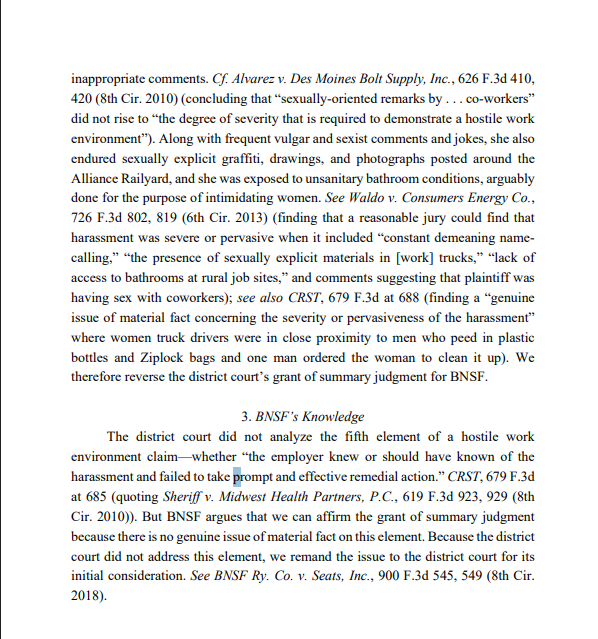EEOC v. BNSF Railway: 8th Circuit Expands Protections for Women Against Workplace Harassment
- M.R Mishra

- Sep 3, 2025
- 2 min read
The Eighth Circuit’s recent decision in EEOC v. BNSF Railway Company centers on an important Title VII enforcement case brought by the Equal Employment Opportunity Commission (EEOC) against BNSF Railway.
The EEOC alleged pervasive sex-based harassment at BNSF’s Alliance Railyard in Nebraska, suing on behalf of Rena Merker a train conductor and a group of similarly aggrieved women.
What's The Matter?

According to the complaint, female employees endured near-daily inappropriate conduct by male coworkers and supervisors, including unwelcome sexual advances, derogatory comments about their abilities, sexually explicit jokes and graffiti, unsanitary restrooms purposefully soiled to intimidate or inconvenience women, and a broader atmosphere of discrimination.
Supervisors often ignored or dismissed complaints, contributing to the allegedly hostile environment.
What Happened in Court?
The EEOC’s first complaint was dismissed in part by the district court, which found the EEOC failed to identify class size or adequately allege that all class members suffered the same harassment as Merker.
Later, summary judgment was granted in favor of BNSF on Merker’s individual claim, with the court finding insufficient severity or pervasiveness to alter the conditions of employment.
On appeal, the Eighth Circuit overturned both dismissals. The appellate court criticized the district court for imposing “novel” heightened pleading standards that are not required by law.
The Eighth Circuit emphasized that the EEOC, when suing on behalf of a group, need not plead that every group member experienced identical acts of harassment by the same individuals or at the same times.
Nor is the EEOC required to plead precise class size at the complaint stage, as long as it provides reasonable notice of the group’s general scope, which was satisfied here by limiting claims to a defined set of positions at a particular facility during a set time.
The court underscored that under established Supreme Court authority, the EEOC acts not as a mere proxy for individuals but as a public enforcer of anti-discrimination laws, and thus its actions are not confined by class action standards such as commonality and typicality under Rule 23.
As for Merker’s individual claim, the Eighth Circuit found that the district court erred in carving the alleged hostile environment into separate incidents rather than considering the totality of circumstances as governing precedent requires.

Evidence showed recurring, humiliating, and intimidating conduct including frequent sexist comments, persistent sexual graffiti, and deliberate restroom sabotage with substantial impact on working conditions.
Additionally, the court held it was error to exclude evidence of harassment from before the statute of limitations window, since both pre- and post-limitations conduct were arguably similar in nature, frequency, and effect.
In conclusion, the Eighth Circuit’s ruling is a significant reaffirmation of established Title VII precedent: courts may not require the EEOC to plead individualized claims for every group member or precise class numbers, and claims of hostile work environment must be evaluated as a whole, not incident by incident.
The court reversed both the dismissal and the grant of summary judgment, remanding for further proceedings to address whether BNSF had adequate knowledge and failed to act, as well as to provide a full trial on the merits.







Comments